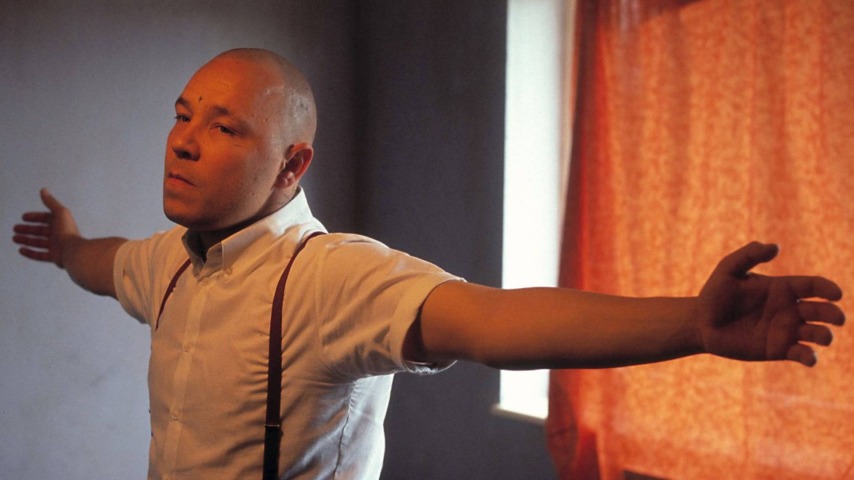As Noel Murray noted in his contemporary review for The A.V. Club, the arrival of Combo, Woody’s live-wire friend who just finished a three-year prison sentence, completely changes the film’s tone and dynamics, essentially splitting the friend group. After crashing a good-vibes party and going on a racist rant—in front of Woody’s Black best friend “Milky” (Romeo Brass’ Andrew Shim), no less—Combo invites everyone over to his flat and launches into a monologue:
“Two thousand years this little tiny fucking island has been raped and pillaged by people that have come here and wanted a piece of it. Two fucking World Wars men have laid down their lives for this—for this, and for what? So we can stick our fucking flag in the ground and say, ‘Yeah, this is England, and this is England, and this is England.’ And for what? For what now? What for? So we can just open the fucking flood gates and let them all come in and say, ‘Yeah, come on. Come in. Get off your ship. Did you have a safe journey? Was it hard, was it? Yeah, here’s a corner. Why don’t you build a shop? Better still, why don’t you build a shop and then build a church, follow your own fucking religion, do what you want? When the single fucking parents out there who can’t get a fucking flat.”
It goes on like this for a good while longer, with Combo eventually letting the racial epithets fly (“I’m gonna say it, ’cause you’re gonna have to fucking hear it,” he reasons before doing so), while Graham gives a performance that somehow feels raw and unhinged yet nuanced and well-calibrated, with Combo’s anger and passion coming in waves. During his speech, the camera picks up the reactions in the room as Woody stares at the floor, shaken and counting down the seconds to get the hell out of there, and, heartbreakingly, a young Shaun starts to take all of these words in.
Soon, a brainwashed Shaun is taken under the ex-con’s wing (Combo tells him that his “dad died for nothin’” if he doesn’t join this fight) and becomes his second-in-command/surrogate son. The pair go see a National Front leader’s speech in a country pub, where the politician masks his racism and xenophobia as patriotism. “We’re not racists; we’re realists,” he says to a rapt audience of frustrated white men who get stirred up and shout back “Send them back!” It’s a scene that sounds chillingly modern, as the far-right rises, and becomes more normalized, both here and abroad. “Some people call us Nazis,” the leader says. “We’re not Nazis. We’re nationalists.”
But although what Meadows is saying about that particular group and rationale is crystal clear, the writer-director seems to be just as, if not more, focused on verisimilitude, for this time and place—in this case, the East Midlands in the summer after the Falklands War—and studying characters than telling a cautionary tale. And while there are bursts of shocking violence in This Is England, you wouldn’t be wrong in describing its spirit as generally gentle. Even Combo, a short-fused monster, has depth and comes off as well rounded—and that credit goes not just to the writing, but Stephen Graham.
Take the scene later in the film when Combo confesses his love to “Lol” (a great Vicky McClure), Woody’s partner. At this point, viewers have already witnessed how much of a rage-fueled bulldog Combo can be (and Graham is, for sure, mesmerizing in spitfire mode), but now they’re seeing a softer, sorrowful, sensitive side. And the actor pulls off the tricky about-face: When his feelings are rebuffed, Graham shifts from teary-eyed, quivering heartache to full-on fury, slamming his head into his car window. Even in just this short scene, Graham delivers an electric, wide-ranging performance, one with peaks and valleys and several different shades that sticks with you long after it’s over. Combo might be the film’s villain, but that doesn’t make his character any less emotionally fascinating or—especially in Graham’s hands—less riveting to witness.
But the film hardly lets him off the hook. After a heart-to-heart talk with Milky about soul music and his family while the two share a joint, his jealousy bubbles up and he snaps again, losing control and beating Milky to a bloody pulp while Shaun cries and begs him to stop. Then This Is England ends pretty much how it started, without Combo and his chaos and hate, and instead with Shaun alone and contemplative, thinking about his dad. Shaun heads to the beach as Clayhill’s beautiful, delicate cover of The Smith’s “Please Please Please Let Me Get What I Want” plays, with the lyrics “See, the luck I’ve had can make a good man turn bad” underscoring the moment and This Is England’s big-heartedness. And then our now-hardened protagonist tosses St. George’s flag—the one that made Combo smile and so proud—and all of that bullshit into the sea for good.









































